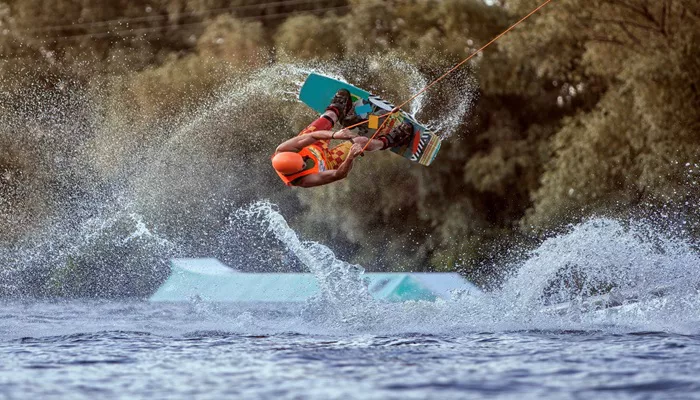Turning is a fundamental skill in wakeboarding. It allows riders to change direction smoothly and maintain control. Mastering turns improves performance and opens doors to advanced tricks. This article explains how to turn in wakeboarding with clear steps and expert tips.
Understanding Wakeboarding Basics
What Is Wakeboarding?
Wakeboarding is a water sport where a rider stands on a board and is pulled by a boat or cable. The rider glides over water, performing tricks and maneuvers. Turning is essential to navigate wakes and perform stylish moves.
Why Turning Is Important
Turns help riders control their speed and direction. Proper turning lets you ride wakes smoothly, avoid obstacles, and set up for tricks. Without good turning skills, it is hard to progress in wakeboarding.
Types of Turns in Wakeboarding
Heel-Side Turns
Heel-side turns involve leaning on your heels to change direction. This turn is smooth and common for beginners. It helps keep balance and control.
Toe-Side Turns
Toe-side turns use the toes to edge the board and steer. This turn feels different from heel-side because it requires shifting weight forward. It is crucial for performing tricks and riding switch.
Carving Turns
Carving is a sharp, controlled turn that uses the edge of the board. It helps gain speed and flow. Carving requires good balance and timing.
Equipment Needed for Turning
Wakeboard
A proper wakeboard with sharp edges is key. Edges help grip the water and make turning easier. Choose a board that matches your skill level and weight.
Bindings
Bindings should fit snugly but comfortably. They connect your feet to the board, giving you control. Good bindings help transfer your movements to the board during turns.
Tow Rope and Handle
The tow rope length affects turning ability. A shorter rope makes turning tighter, while a longer rope gives more room. The handle should be easy to grip to maintain balance during turns.
How to Turn in Wakeboarding: Step-by-Step Guide
1. Start in the Correct Stance
Stand with knees bent and weight centered over the board. Keep your arms straight but relaxed, holding the handle at waist height. Your shoulders should face the direction of travel.
2. Focus on Your Edge
Turning begins with edging. To turn heel-side, lean back slightly and press your heels down. For toe-side, lean forward and press your toes. This shifts the board’s edge into the water.
3. Shift Your Weight
Slowly shift your weight to the foot on the side you want to turn. Keep your knees bent to absorb shocks. Avoid leaning too far or you risk losing balance.
4. Use Your Shoulders and Head
Look where you want to go. Your shoulders and head lead the turn. Turning your upper body guides your lower body and the board naturally follows.
5. Control the Handle
Keep the handle close to your body during turns. Pull the handle slightly toward the side of the turn to help guide your direction. Don’t let the rope slack or pull too hard.
6. Complete the Turn Smoothly
As the board changes direction, keep your body balanced and relaxed. Maintain steady speed and prepare for the next move or trick.
Common Mistakes When Turning and How to Fix Them
Leaning Too Far Back
Many beginners lean too far back when turning heel-side. This causes loss of control. To fix, focus on keeping weight centered and bend your knees more.
Not Looking in the Turn Direction
Failing to look where you want to go can cause imbalance. Always turn your head and shoulders toward the direction of the turn.
Using Arms Instead of Body
Relying on your arms to pull the handle instead of rotating your body reduces turning effectiveness. Use your shoulders and torso to lead, keeping arms relaxed.
Stiff Legs
Stiff legs make turns jerky and unbalanced. Keep knees bent and flexible to absorb water movement and maintain control.
Advanced Turning Techniques
Switch Turns
Switch means riding with your non-dominant foot forward. Learning to turn switch improves your versatility and opens more tricks.
Wake-to-Wake Turns
These turns use the boat’s wake to change direction sharply. Timing and body control are key. Practice edging and weight shifts precisely to master these.
360 Turns
A 360 turn is a full spin on the water. It requires strong edging, quick body rotation, and speed control. This trick takes practice but adds flair to your riding.
Training Tips to Improve Your Turns
Practice Balance Exercises
Strong balance helps control the board during turns. Use balance boards or yoga to improve stability off the water.
Work on Core Strength
Your core muscles help rotate your body and keep you stable. Incorporate core workouts into your routine.
Watch and Learn
Study professional wakeboarders. Watch videos to understand how they shift weight and use body movements to turn smoothly.
Train Regularly
Consistent practice on the water is the best way to improve turns. Start slow and gradually increase speed and difficulty.
Safety Tips When Turning in Wakeboarding
Wear a Life Jacket
Always wear a properly fitted life jacket to stay safe in the water.
Check Your Equipment
Ensure your board, bindings, and rope are in good condition before riding.
Warm Up Before Riding
Stretch and warm up muscles to prevent injury during turns and tricks.
Communicate with the Boat Driver
Good communication helps maintain safe speeds and smooth pulls, which aid in safe turning.
Conclusion
Turning in wakeboarding is essential for control and progression. By focusing on stance, edging, weight shifts, and body rotation, riders can improve their turns effectively. Practice, patience, and proper technique will help any wakeboarder ride confidently and perform with style.

